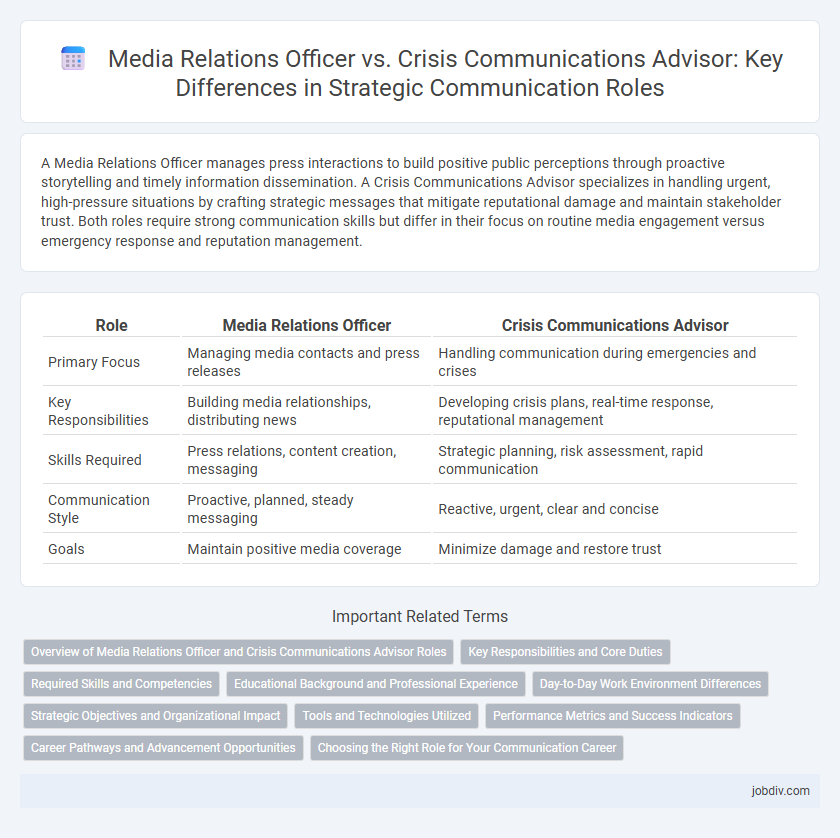A Media Relations Officer manages press interactions to build positive public perceptions through proactive storytelling and timely information dissemination. A Crisis Communications Advisor specializes in handling urgent, high-pressure situations by crafting strategic messages that mitigate reputational damage and maintain stakeholder trust. Both roles require strong communication skills but differ in their focus on routine media engagement versus emergency response and reputation management.
Table of Comparison
| Role | Media Relations Officer | Crisis Communications Advisor |
|---|---|---|
| Primary Focus | Managing media contacts and press releases | Handling communication during emergencies and crises |
| Key Responsibilities | Building media relationships, distributing news | Developing crisis plans, real-time response, reputational management |
| Skills Required | Press relations, content creation, messaging | Strategic planning, risk assessment, rapid communication |
| Communication Style | Proactive, planned, steady messaging | Reactive, urgent, clear and concise |
| Goals | Maintain positive media coverage | Minimize damage and restore trust |
Overview of Media Relations Officer and Crisis Communications Advisor Roles
A Media Relations Officer manages interactions with the press, crafting press releases and coordinating interviews to maintain a positive public image. A Crisis Communications Advisor specializes in developing strategies to address emergencies, mitigating reputational damage during critical incidents. Both roles require strong communication skills but differ in focus, with media relations emphasizing proactive media engagement and crisis advising centered on reactive damage control.
Key Responsibilities and Core Duties
A Media Relations Officer manages public image by coordinating press releases, arranging interviews, and maintaining strong relationships with journalists to ensure accurate media coverage and brand consistency. A Crisis Communications Advisor specializes in developing strategic response plans during emergencies, controlling information flow, and mitigating reputational damage through timely, transparent communication. Both roles require expertise in messaging and stakeholder engagement but differ as Media Relations Officers focus on proactive media management while Crisis Communications Advisors handle reactive crisis situations.
Required Skills and Competencies
Media Relations Officers excel in crafting clear messages, managing press interactions, and building positive media relationships, requiring strong writing, public speaking, and interpersonal skills. Crisis Communications Advisors specialize in rapid response, risk assessment, and strategic messaging during emergencies, demanding expertise in problem-solving, emotional intelligence, and decision-making under pressure. Both roles necessitate adaptability, media savvy, and a deep understanding of audience perception to effectively shape public narratives.
Educational Background and Professional Experience
A Media Relations Officer typically holds a degree in communications, journalism, or public relations, complemented by experience managing media inquiries and crafting press releases to maintain a positive organizational image. A Crisis Communications Advisor often possesses advanced education in strategic communication or public relations and extensive professional experience in managing high-pressure situations, developing crisis communication plans, and mitigating reputational risks. Both roles demand strong interpersonal skills, but the Crisis Communications Advisor requires specialized expertise in rapid-response strategies and stakeholder management during emergencies.
Day-to-Day Work Environment Differences
A Media Relations Officer primarily manages regular interaction with journalists, drafts press releases, and coordinates media coverage to maintain a positive public image. In contrast, a Crisis Communications Advisor operates under high-pressure conditions, rapidly developing strategic responses to mitigate reputational damage during emergencies or controversies. While Media Relations Officers maintain steady communication flow, Crisis Advisors focus on timed, tactical messaging within unpredictable and urgent scenarios.
Strategic Objectives and Organizational Impact
A Media Relations Officer primarily focuses on building and maintaining positive relationships with the media to enhance organizational visibility and brand reputation, aligning communication strategies with marketing and public affairs objectives. In contrast, a Crisis Communications Advisor is tasked with developing and implementing rapid-response plans to protect an organization's reputation during emergencies, ensuring clear, consistent messaging to mitigate risks and maintain stakeholder trust. Both roles strategically influence organizational impact by shaping public perception, but the Advisor operates under high-pressure scenarios with immediate consequences, while the Officer drives long-term media engagement and narrative control.
Tools and Technologies Utilized
Media Relations Officers leverage media monitoring software, press release distribution platforms, and social media management tools to maximize outreach and engagement with journalists and the public. Crisis Communications Advisors utilize real-time crisis management systems, sentiment analysis tools, and secure communication channels to swiftly address and mitigate reputational risks. Both roles incorporate advanced analytics and multimedia content creation technologies to enhance message precision and effectiveness during routine communications and high-pressure situations.
Performance Metrics and Success Indicators
Media Relations Officers measure success through metrics such as media coverage volume, sentiment analysis, and journalist engagement rates, ensuring positive brand visibility and message consistency. Crisis Communications Advisors prioritize speed of response, stakeholder reach, and sentiment recovery metrics to mitigate reputational damage and restore public trust during emergencies. Both roles leverage media monitoring tools and quantitative data to evaluate effectiveness, but Crisis Communications Advisors emphasize real-time impact and resolution efficiency.
Career Pathways and Advancement Opportunities
A Media Relations Officer typically advances by developing strong press contacts and mastering strategic messaging across diverse platforms, often progressing into communications manager roles within public relations or corporate communications departments. A Crisis Communications Advisor's career pathway centers on specializing in rapid-response strategies and risk management, with advancement opportunities leading to senior crisis management positions or executive communications roles in high-stakes industries. Both roles benefit from continuous skill development in media monitoring, stakeholder engagement, and digital communication technologies to enhance career growth and leadership potential.
Choosing the Right Role for Your Communication Career
A Media Relations Officer specializes in managing an organization's relationship with journalists, crafting press releases, and securing positive media coverage to enhance brand reputation. A Crisis Communications Advisor focuses on developing strategic responses during emergencies, mitigating damage, and maintaining stakeholder trust under pressure. Selecting the right role depends on your strengths in proactive media engagement versus reactive, high-pressure problem-solving within communication careers.
Media Relations Officer vs Crisis Communications Advisor Infographic

 jobdiv.com
jobdiv.com